Quote from @Peyton LaBarbera:
Quote from @Peyton LaBarbera:
So correct me if I am wrong but doesn't an increase in rents decrease the cap rate since the property is more stable with a wider spread between gross income and the operating expenses
Ohhh wait never mind I get it now... the increase in NOI makes the cap rate rise since the rate of return is higher.
Your question is about valuation, and about analyzing a property for potential acquisition. From a valuation standpoint, the calculated cap rates in your original post and some of the other posts here (the 5.3 and the 6.6) are irrelevant and essentially useless.
In your initial post, you mentioned the average cap rate in the area the property is located is 6.4. I’m assuming you obtained this 6.4 cap rate from reliable sources such as local commercial brokers, bankers, other investors. If so then THIS is the cap rate that matters! This is the ‘market’ cap rate! It’s even better if this 6.4CAP was the average cap rate of recent sales involving a property similar to 15-unit apartment building you’re analyzing. These recent sales are the COMPS for the 15-unit apartment.
The 6.4CAP is what the market (i.e. potential investors) uses to value properties similar to the 15-unit apartment (NOT the 5.3 or 6.6, again they are irrelevant). Investors are looking to buy NOI (the building, parking lot, the yard, etc. simply come with the NOI). A 6.4 market CAP means a dollar of ACTUAL and VERIFIED NOI is worth $15.625 (or $1 / 6.4%). So the estimated fair value of the 15-unit apartment is 132,000 * 15.625 = $2,062,500. It’s important to understand that this 6.4 market cap rate is exactly that… market! Meaning it is determined by the market. You have no control over it.
The listing says the property has a 5.3CAP (again, you should ignore this), but as you have figured out, the asking price calculates to be 132,000 / 5.3% which is $2,490,566. So we can immediately see that the seller is asking for a PREMIUM of $428,066. The agent says that the building could have rent growth to a 6.6CAP (again, you should ignore this). A couple of problems with this:
- The seller is asking for a price that includes what the property could potentially do, not based on actual. I don’t know how you feel about purchasing something potential instead of actual.
- The agent tries to make a case that the property cap rate could increase from 5.3 to 6.6. An increase in cap rate is a good thing, right? Well it depends. In this case, I can easily make the argument that the potential increase in rent would increase the value of the property by approximately equal to the PREMIUM seller is asking (as stated above). So the agent is really suggesting that the seller should reap the benefits of potential rent increase, but the buyer should the work. I don’t know how you feel about someone else reaping the benefits of your hard work!
There is a lot of misconception about cap rate, it is often misused as a performance metric which leads to questions such as "what's a good cap rate?", "what's the minimum cap rate I should accept?". No such thing as a "good" cap rate or "minimum acceptable" cap rate. The claim that the agent makes is also a misconception/misuse of cap rate. You don't acquire a property, then increase the cap rate, then sell for a profit. Cap rate is market driven, you have no control over it, so you can't increase or decrease it. Instead, the correct process is you acquire a property, increase NOI, then hopefully sell for a profit (when you go to sell, you're still at the mercy of the prevailing market cap rate over which you have no control). So It's the NOI that needs to be increased or enhanced because NOI is what investors are out there to purchase. They're not looking to buy cap rate, they're buying NOI. This is also the reason why calculating the cap rate of the property by plugging in numbers into the formula (NOI/Purchase Price) is just useless. Worry about NOI not cap rate. Some poor investor out there might think this 15-unit is a good buy because, well… cap rate could increase from 5.3 to 6.6!! The higher the cap rate the better the deal, right??? Nope, that's a misconception!
Cheers… Immanuel









